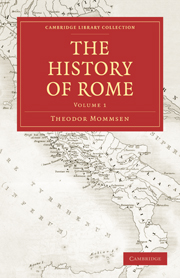Book contents
- Frontmatter
- PREFACE
- PREFATORY NOTE BY THE TRANSLATOR
- EXTRACT FROM DR. MOMMSEN'S PREFACE
- Contents
- BOOK FIRST THE PERIOD ANTERIOR TO THE ABOLITION OF THE MONARCHY
- BOOK SECOND FROM THE ABOLITION OF THE MONARCHY IN ROME TO THE UNION OF ITALY
- CHAPTER I CHANGE OF THE CONSTITUTION.—LIMITATION OF THE POWER OF THE MAGISTRATE
- CHAPTER II THE TRIBUNATE OF THE PLEBS AND THE DECEMVIRATE
- CHAPTER III THE EQUALIZATION OF THE ORDERS AND THE NEW ARISTOCRACY
- CHAPTER IV FALL OF THE ETRUSCAN POWER. THE CELTS
- CHAPTER V SUBJUGATION OF THE LATINS AND CAMPANIANS BY ROME
- CHAPTER VI STRUGGLE OF THE ITALIANS AGAINST ROME
- CHAPTER VII THE STRUGGLE BETWEEN PYRRHUS AND ROME
- CHAPTER VIII LAW. RELIGION. MILITARY SYSTEM. ECONOMIC CONDITION. NATIONALITY
- CHAPTER IX ART AND SCIENCE
- APPENDIX: ON THE PATRICIAN CLAUDII
- ADDITIONS AND CORRECTIONS
CHAPTER I - CHANGE OF THE CONSTITUTION.—LIMITATION OF THE POWER OF THE MAGISTRATE
Published online by Cambridge University Press: 05 October 2010
- Frontmatter
- PREFACE
- PREFATORY NOTE BY THE TRANSLATOR
- EXTRACT FROM DR. MOMMSEN'S PREFACE
- Contents
- BOOK FIRST THE PERIOD ANTERIOR TO THE ABOLITION OF THE MONARCHY
- BOOK SECOND FROM THE ABOLITION OF THE MONARCHY IN ROME TO THE UNION OF ITALY
- CHAPTER I CHANGE OF THE CONSTITUTION.—LIMITATION OF THE POWER OF THE MAGISTRATE
- CHAPTER II THE TRIBUNATE OF THE PLEBS AND THE DECEMVIRATE
- CHAPTER III THE EQUALIZATION OF THE ORDERS AND THE NEW ARISTOCRACY
- CHAPTER IV FALL OF THE ETRUSCAN POWER. THE CELTS
- CHAPTER V SUBJUGATION OF THE LATINS AND CAMPANIANS BY ROME
- CHAPTER VI STRUGGLE OF THE ITALIANS AGAINST ROME
- CHAPTER VII THE STRUGGLE BETWEEN PYRRHUS AND ROME
- CHAPTER VIII LAW. RELIGION. MILITARY SYSTEM. ECONOMIC CONDITION. NATIONALITY
- CHAPTER IX ART AND SCIENCE
- APPENDIX: ON THE PATRICIAN CLAUDII
- ADDITIONS AND CORRECTIONS
Summary
Political and social distinctions in Rome.
The strict conception of the unity and omnipotence of the state in all matters pertaining to it, which was the central principle of the Italian constitutions, placed in the hands of the single president nominated for life a formidable power, which was felt perhaps by the enemies of the land, but was not less heavily felt by its citizens. Abuse and oppression could not fail to ensue from it, and, as a necessary consequence, efforts were made to accomplish its limitation. It was, however, the grand distinction of the efforts after reform and the revolutions in Rome, that there was no attempt to impose limitations on the community as such or even to deprive it of corresponding organs of expression—that there never was any endeavour to assert the so-called natural rights of the individual in contradistinction to the community—that on the contrary the attack was wholly directed against the form in which the community was represented. Prom the times of the Tarquins down to those of the Gracchi the cry of the party of progress in Rome was not for limitation of the power of the state, but for limitation of the power of the magistrates; nor amidst that cry was the truth ever forgotten, that the people ought not to govern, but ought, on the contrary, to be governed.
That struggle developed itself within the burgess-body. Side by side with it ran another movement, the cry of the non-burgesses for equality of political privileges.
- Type
- Chapter
- Information
- The History of Rome , pp. 253 - 273Publisher: Cambridge University PressPrint publication year: 2010First published in: 1862

